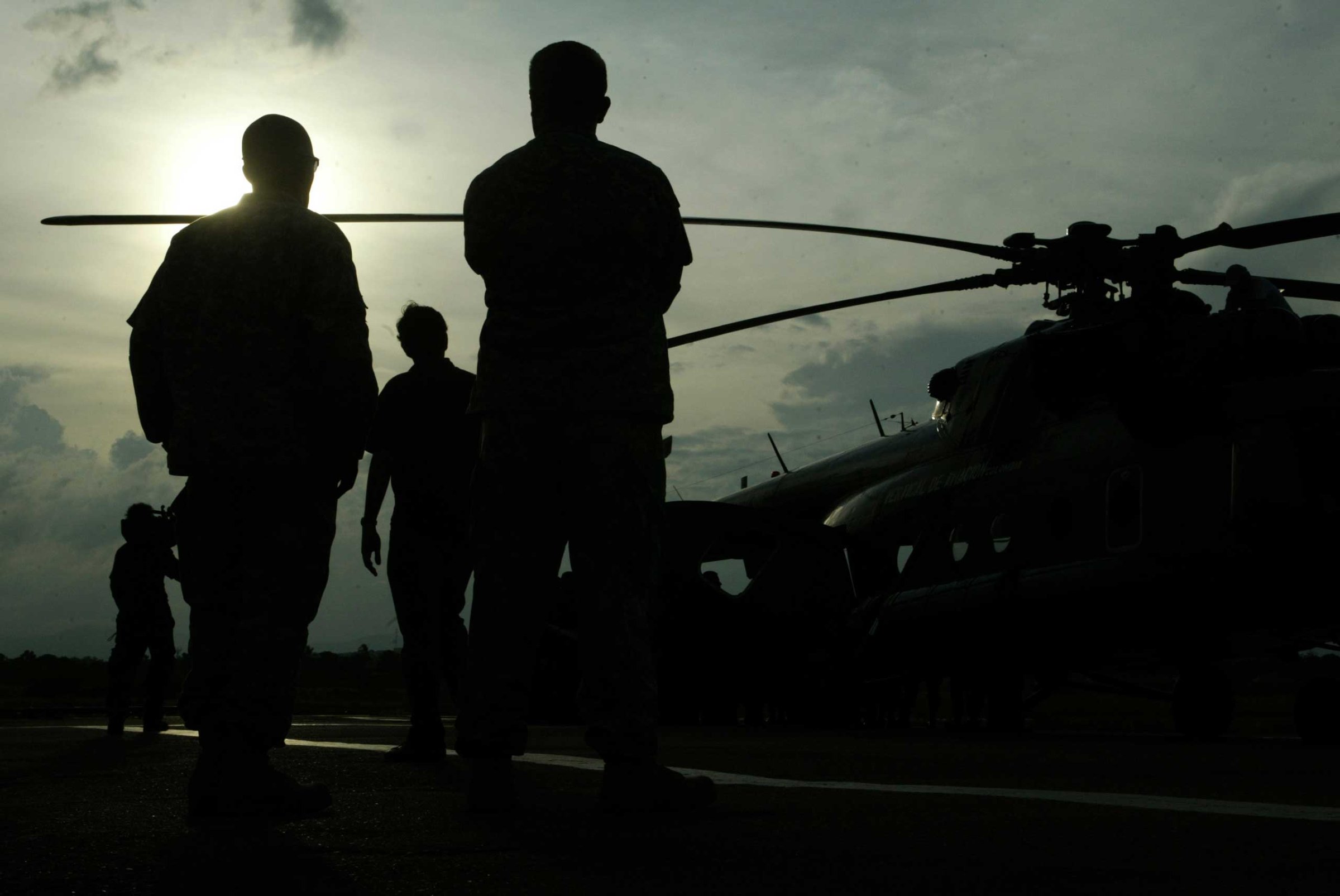
Although United States military personnel have helped Colombia gain the upper hand in its war against drug-trafficking guerrillas, Olga Castillo maintains that their off-duty actions can be far less noble. Castillo claims a U.S. Army sergeant and a military contractor drugged her 12-year-old daughter, took her to a Colombian military base near the town of Melgar, and raped her.
A U.S. Army investigation determined that Castillo’s accusations were unfounded and no one has been charged in the case. But Castillo calls the Army investigation a whitewash. And now, a controversial official history of the war alleges that between 2003 and 2007 U.S. troops and foreign military contractors working for U.S. companies sexually abused 53 children in and around Melgar — including Castillo’s daughter.
“Since then, she’s never been the same,” Castillo tells TIME about the incident which happened in 2007. “She’s tried to commit suicide three times.”
There’s no dispute that thousands of Colombians were sexually abused during the country’s 51-year-old conflict. The perpetrators were usually Colombian soldiers, paramilitaries or guerrillas. But a Colombian truth commission report claims that U.S. troops and foreign military contractors were part of the problem.
The report denounces what it calls “sexual imperialism” and states that “there exists abundant information about sexual violence with absolute impunity thanks to bilateral agreements (that provide) diplomatic immunity to U.S. officials.”
Christopher Grey, a spokesman for the U.S. Army’s Criminal Investigation Command, said his office is launching an investigation into these allegations. “We take this issue very seriously and will aggressively pursue all credible allegations,” Grey said in an e-mail.
The truth commission report was authorized at ongoing peace talks in Cuba between the Colombian government and the guerillas of Fuerzas Armadas Revolucionarias de Colombia (FARC). Twelve Colombian academics, half chosen by the government and half by the guerrillas, authored the report. Renan Vega, a left-wing university professor who wrote the chapter accusing the Americans of sex abuse, is a FARC appointee. Like the FARC, Vega is fiercely critical of U.S. troops and foreign contractors in Colombia whom he calls “mercenaries.”
What’s more, Vega’s allegations make up just one paragraph of the 800-page report. He does not cite criminal complaints or other sources to back up his claim of 53 sexual assaults. Vega could not be reached for comment. A spokesman for the Colombian Attorney General’s office said there is no record of widespread sexual abuse by U.S. troops or foreign contractors in the Melgar area in the mid-2000s.
“I would say there’s no truth to anything involving 50-plus people,” said Keith Sparks, who during the mid-2000s was country manager for DynCorp, one of the largest U.S. military contractors in Colombia. “We had at one point up to 1,000 employees. And there were never, on my watch, any accusations of rape.”
Still, some experts call the truth commission allegations troubling, especially in the wake of other instances of bad behavior by U.S. government employees in Colombia.
In April 2005, for example, five U.S. soldiers who had been working at an anti-narcotics base in eastern Colombia were detained upon arrival in the United States for smuggling 18 kilograms of cocaine. A month later, two more American troops were arrested in a scheme to sell thousands of rounds of assault rifle ammunition to paramilitary groups.
A higher-profile embarrassment came in the run-up 2012 Summit of the Americas in the Colombian city of Cartagena. Members of President Obama’s Secret Service advance team spent a night of heavy partying with local prostitutes, one of whom demanded an $800 fee. That led to a loud argument that spilled into the hallway of their hotel and the resulting “Prosti-Gate” scandal became the enduring memory of the Summit.
And recent investigations by the U.S. Justice Department and the Drug Enforcement Administration found that dating back to 2001 DEA agents had attended numerous sex parties with Colombian prostitutes that were paid for by drug dealers hoping to curry favor with the DEA agents. Adding to the security risk, the prostitutes were constantly around the agents’ laptop computers, BlackBerry devices and other sensitive equipment.
Other egregious behavior included a DEA agent accepting a gift of an AK-47 assault rifle from a paramilitary gunman and another agent badly wounding a prostitute after getting into a fight and throwing a drinks glass at her face. Yet the harshest punishment meted out to these offending agents was a 14-day suspension.
“We now have a handful of examples that are quite troubling,” said Adam Isacson, a security policy analyst for the independent Washington Office on Latin America. “But there hasn’t been a lot of scrutiny or follow up or evidence that U.S. authorities were taking it very seriously.”
Maria Victoria Llorente, director of the Bogotá think tank Ideas for Peace, points out that the long-running war on drugs and guerrillas has produced myriad corruption, human rights and sexual abuse scandals involving Colombian police and soliders. So it’s not exactly shocking, she says, that some of their U.S. counterparts may have also gone over to the dark side.
More Must-Reads from TIME
- Cybersecurity Experts Are Sounding the Alarm on DOGE
- Meet the 2025 Women of the Year
- The Harsh Truth About Disability Inclusion
- Why Do More Young Adults Have Cancer?
- Colman Domingo Leads With Radical Love
- How to Get Better at Doing Things Alone
- Michelle Zauner Stares Down the Darkness
Contact us at letters@time.com